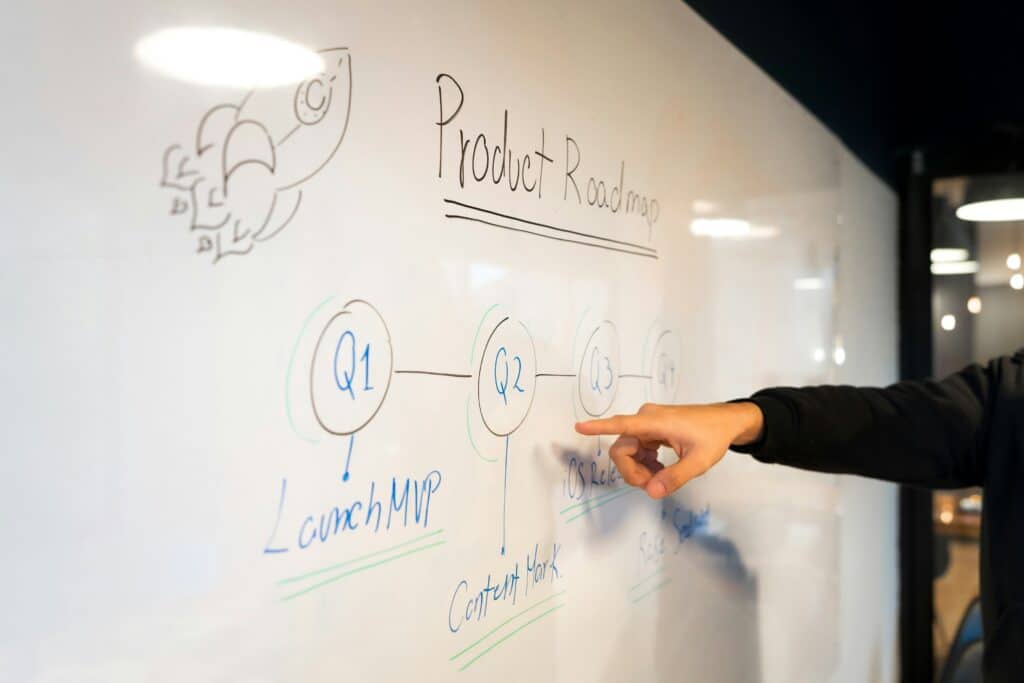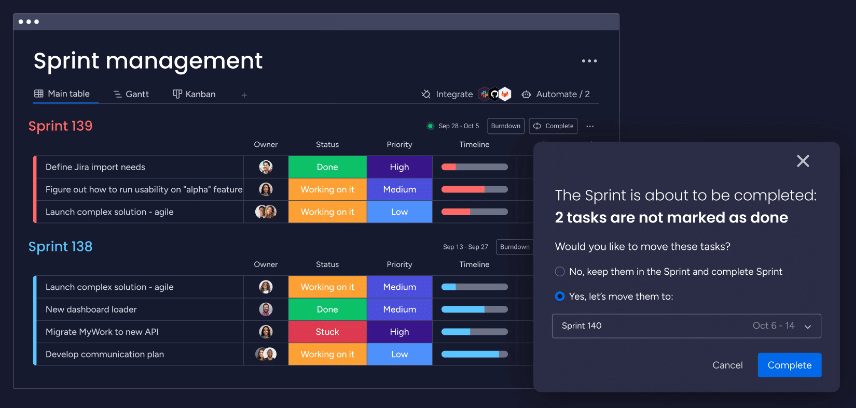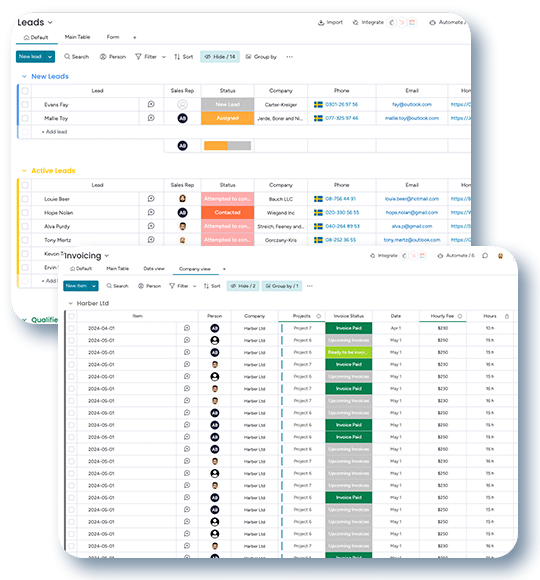Introduction
In the ever-evolving landscape of project management, the introduction of Agile methodologies has brought about a significant shift in how projects are approached, executed, and delivered. Amidst this transformation, two roles have emerged as pivotal to the success of projects in Agile and traditional frameworks alike. These are the Scrum Master and the Project Manager. Understanding the distinctions between a Scrum Master vs Project Manager is not just about grasping the nuances of job titles. It’s also about recognizing the unique value each brings to the table in facilitating project success in diverse environments.
At the heart of this exploration is the Agile methodology. The Agile methodology is a practice that prioritizes flexibility, team collaboration, and customer satisfaction in project delivery. The Scrum Master embodies the spirit of Agile within the Scrum framework. They act as a guide and facilitator for the team as they navigate through the complexities of project tasks. In contrast, the Project Manager often operates within a broader spectrum. They apply a mix of traditional and Agile practices to oversee project completion from inception to closure.
Scrum Master vs Project Manager
The debate surrounding Scrum Master vs Project Manager is not about which role is superior. It’s about understanding how each contributes to the project’s ecosystem. This blog post aims to demystify these roles, providing clarity on their responsibilities, the skills they bring to the table, and how they can influence the outcome of projects. Whether you’re entrenched in the world of project management, considering a career pivot, or simply curious about the Agile framework’s inner workings, understanding the key differences and synergies between a Scrum Master and a Project Manager is crucial.
As we delve deeper into the nuances of Scrum Master vs Project Manager, keep in mind that the choice between the two should always be guided by the project’s specific needs, the team’s dynamics, and the organizational goals. Join us as we embark on a comparative journey to uncover what sets these roles apart and how they can harmoniously coexist to propel projects towards their ultimate success.
The Role of a Scrum Master
In the world of Agile project management, the Scrum Master emerges as a central figure. They champion the Agile methodology and ensure the Scrum framework is executed efficiently. The distinction between a Scrum Master vs Project Manager becomes particularly evident in this context. Where the Scrum Master’s role is deeply entrenched in facilitating team dynamics and adhering to Agile practices.
Agile Methodology and Scrum Framework
Agile methodologies prioritize adaptability, continuous feedback, and iterative development. Within this broad umbrella, the Scrum framework offers a structured yet flexible approach to managing complex projects. The Scrum Master is pivotal in this ecosystem, ensuring the team fully understands and implements Scrum processes. Unlike a Project Manager, whose responsibilities might span various methodologies and project scopes, the Scrum Master is solely dedicated to optimizing the Agile process. They focus only on Scrum values and principles.
Key Responsibilities of a Scrum Master
The Scrum Master’s responsibilities are multifaceted, emphasizing facilitation, coaching, and support to empower the Scrum team:
- Facilitating Scrum Ceremonies: The Scrum Master organizes and leads key Scrum events such as daily stand-ups, sprint planning, retrospectives, and reviews. These ceremonies are crucial for team collaboration and project progress.
- Ensuring Team Adherence to Agile Principles: Unlike a Project Manager, who might navigate between various project management methodologies, the Scrum Master is the Agile methodology’s guardian. They ensure the team embraces its principles for maximum efficiency and innovation.
- Removing Obstacles: Identifying and eliminating impediments that hinder the team’s productivity is a key duty. This can range from logistical challenges to interpersonal conflicts, ensuring the team’s path to success is as smooth as possible.
Skills and Attributes of an Effective Scrum Master
The effectiveness of a Scrum Master is not solely in their knowledge of the Scrum framework but in their ability to lead with an Agile mindset:
- Agile Mindset and Servant Leadership: The Scrum Master leads by serving the team, promoting collaboration, and supporting the team’s self-organization and autonomy.
- Conflict Resolution and Communication Skills: Navigating through conflicts and facilitating clear communication are paramount. The ability to mediate disputes and foster an environment of open dialogue differentiates an effective Scrum Master.
- Adaptability and Problem-Solving: In contrast to a Project Manager, who may apply a wide range of methodologies to ensure project success, a Scrum Master must be adept at solving problems within the confines of Agile principles. As a result, this often requires creative and adaptive solutions.
Omnitas Newsletter
Sign up for our monthly newsletter to stay up-to-date on our latest blog articles, videos and events!
Thank you!
You have successfully joined our subscriber list.
The Role of a Project Manager
While the Scrum Master is the linchpin in Agile environments, specifically within the Scrum framework, the Project Manager operates across a broader spectrum. They often navigate between various project management methodologies to steer projects to success. The role of a Project Manager vs Scrum Master is defined by a more extensive scope of responsibilities. These responsibilities range from planning and execution to closing, regardless of the project management methodology employed.
Traditional vs Agile Project Management
Understanding the landscape in which Project Managers operate requires a grasp of both traditional and Agile project management practices. Traditional project management is characterized by its linear, sequential approach, often represented by the Waterfall model. Where each phase of the project must be completed before the next begins. Agile project management, on the other hand, emphasizes iterative development, flexibility, and ongoing feedback, with Scrum being a prominent example.
A Project Manager’s effectiveness lies in their ability to adapt their management style to the project’s needs, whether that calls for a traditional, Agile, or hybrid approach. This adaptability is a distinguishing feature when comparing a Project Manager vs Scrum Master, as the latter focuses solely on optimizing Agile practices within the Scrum framework.
Key Responsibilities of a Project Manager
Project Managers bear the weight of ensuring that projects are completed on time, within budget, and to the agreed-upon quality standards:
- Project Planning, Execution, and Closure: Comprehensive planning, overseeing execution, and formal closure are central to a Project Manager’s role. This encompasses defining project scopes, scheduling, resource allocation, and risk management. This distinguishes their role from a Scrum Master, who focuses more on facilitating team dynamics within the Scrum framework.
- Resource Management and Risk Assessment: Project Managers are tasked with managing both human and material resources. This is to ensure optimal allocation and productivity. They are also responsible for identifying potential risks and devising mitigation strategies, a key component of project success.
- Stakeholder Communication and Reporting: Effective communication with stakeholders, including clients, team members, and senior management, is crucial. Project Managers must maintain transparency through regular updates and reports. They need to ensure all stakeholders are aligned with the project’s progress and outcomes.
Skills and Attributes of an Effective Project Manager
The role of a Project Manager demands a diverse set of skills and attributes. This is to ensure they can navigate the complexities of any project:
Leadership and Decision-Making: Strong leadership skills enable Project Managers to guide their teams through the project lifecycle efficiently, making critical decisions that affect the project’s direction and outcomes.
Organizational and Negotiation Skills: Exceptional organizational abilities allow for the effective coordination of project activities and resources. Negotiation skills are also vital, especially in managing contracts, resolving conflicts, and ensuring stakeholder alignment.
Versatility and Problem-Solving: Unlike a Scrum Master, who specializes in the Agile and Scrum frameworks, Project Managers must exhibit versatility. They have to be able to apply various methodologies to lead projects successfully. Problem-solving skills are essential in overcoming obstacles and ensuring project delivery.

Scrum Master vs Project Manager: A Comparative Analysis
The comparison between a Scrum Master and a Project Manager goes beyond mere job titles. It goes into the core of project management and team facilitation within different frameworks. While both roles aim to ensure project success, their approaches, responsibilities, and areas of focus vary significantly, reflecting their distinct contributions to the project management realm.
Areas of Overlap
Despite their differences, there are areas where the roles of Scrum Master and Project Manager overlap:
- Team Leadership and Motivation: Both roles are integral in leading and motivating their teams. However, their approaches might differ due to the frameworks they operate within.
- Focus on Project Success: At their core, both roles are deeply committed to the success of the project. However, they employ their unique skills and methodologies to reach project goals.
- Stakeholder Communication: Effective communication with stakeholders is crucial for both roles, ensuring that expectations are managed and project progress is transparent.
These overlaps highlight that regardless of the methodology or framework, the ultimate goal of project success unites both roles. This further showcases the importance of leadership and communication in project management.
Distinguishing Factors
While there are similarities, the distinguishing factors between a Scrum Master and a Project Manager are significant:
- Scope of Role and Methodology Adherence: The Scrum Master focuses exclusively on the Scrum framework. They act as a facilitator within Agile methodologies. In contrast, the Project Manager may navigate across various methodologies, from traditional to Agile, tailoring their approach to the project’s needs.
- Decision-Making Authority: Project Managers typically have broader decision-making authority, encompassing budget, scope, and resource allocation. Scrum Masters, however, focus more on guiding the team and ensuring adherence to Agile practices, with decision-making often being more collaborative and team-driven.
- Project Lifecycle Involvement: A Project Manager is involved throughout the project lifecycle, from initiation to closure. However, Scrum Masters are primarily focused on the execution phase, particularly in facilitating the Agile process during sprints.
These differences illustrate the unique roles each plays within their respective frameworks. They emphasize the Scrum Master’s focus on team dynamics and Agile facilitation versus the Project Manager’s broader responsibility for project delivery across all phases.
Choosing the Right Path for Your Project
The choice between a Scrum Master and a Project Manager should be guided by the project’s specific needs, organizational goals, and the preferred project management methodology:
- Agile vs Traditional Projects: For projects adopting Agile methodologies, a Scrum Master is essential to guide the team through the Agile process effectively. In contrast, projects that require a traditional, structured approach may benefit more from the comprehensive oversight of a Project Manager.
- Project Complexity and Scope: The size and complexity of the project can also dictate the choice. Large-scale projects with fixed deadlines and budgets may align better with the skills of a Project Manager. On the other hand, projects that value adaptability and incremental progress may find a Scrum Master more beneficial.
Conclusion
Navigating the intricacies of project management requires a clear understanding of the roles and responsibilities that contribute to a project’s success. Through our exploration of Scrum Master vs Project Manager, it’s evident that while both roles share a common goal of project success, their paths diverge significantly in approach, focus, and methodology adherence. This distinction is not just theoretical but has practical implications for project execution and outcomes.
The Scrum Master, with their deep-rooted commitment to the Agile methodology and the Scrum framework, is indispensable for projects that prioritize flexibility, iterative progress, and team collaboration. Their role as facilitators and coaches underscores the importance of empowering teams to self-organize and adapt swiftly to change. These are characteristics that are quintessential to Agile’s success.
Conversely, the Project Manager’s realm extends across the spectrum of project management methodologies. They embody leadership that navigates through traditional, Agile, and hybrid approaches. Their comprehensive oversight on planning, execution, and closure makes them pivotal for projects requiring stringent management of scope, budget, and timelines.
Scrum Master or Project Manager?
The decision to lean towards a Scrum Master or a Project Manager should be meticulously informed by the project’s nature, objectives, and organizational culture. It’s not merely a choice between titles but a strategic decision that aligns with the project’s methodology, complexity, and desired outcomes.
As the landscape of project management continues to evolve, so too does the role of these key players. Whether your project thrives under the agile facilitation of a Scrum Master or the structured oversight of a Project Manager, the ultimate aim remains the same: to navigate through challenges and lead your project to successful completion. Understanding the nuanced differences and complementarities between these roles is your first step towards achieving that goal.
In conclusion, the dialogue between Scrum Master vs Project Manager is not about competition but about choosing the right approach for your project’s success. As we navigate the complexities of modern project management, the insights into these roles illuminate the path to effective, adaptable, and successful project execution.
If you found this blog post useful, make sure to sign up for our monthly newsletter below. Stay in the loop regarding all things business efficiency and automation!














